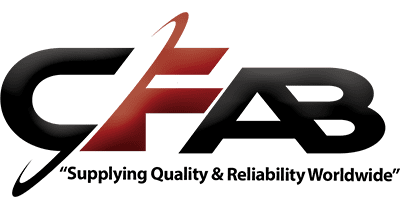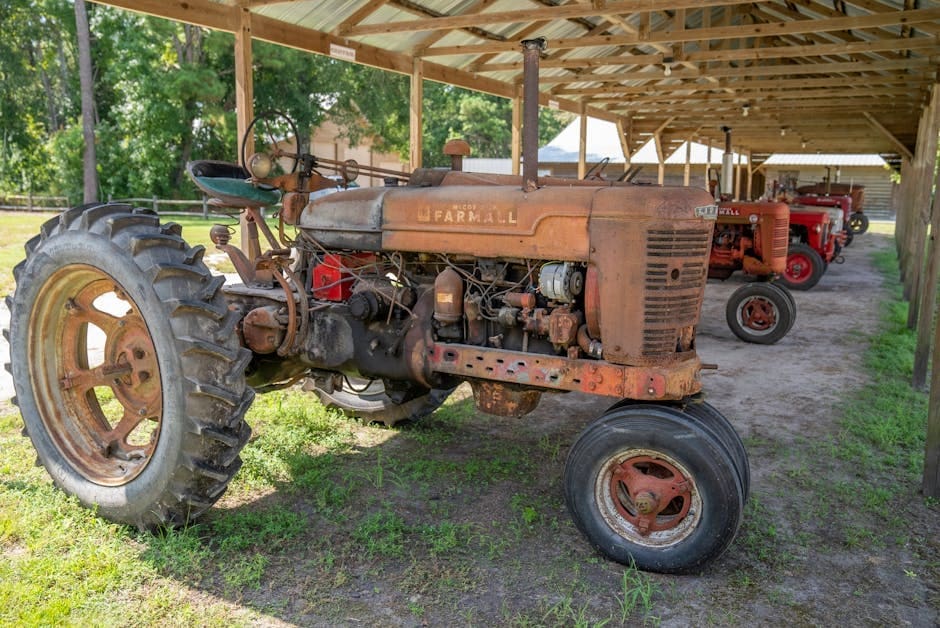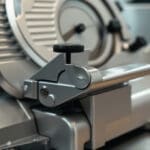Antique farm machinery for sale is a treasure trove for enthusiasts and collectors looking to own a piece of agricultural history. These remarkable machines, with their intricate designs and historical significance, offer a unique glimpse into the evolution of farming practices. Collectors and hobbyists can find iconic brands like John Deere and International Harvester, cherished for their durability and craftsmanship.
- Antique farm machinery: Historical significance and craftsmanship
- Where to find: Online marketplaces, auctions, and classifieds
- Brands to consider: John Deere, International Harvester
As someone who appreciates the nostalgic charm and engineering marvels of the past, I am Todd Cleppe, an expert in antique farm machinery for sale. With a career rooted in engineering and machinery solutions, I have learned to value both modern innovations and historical achievements in the field.

Understanding Antique Farm Machinery
Antique farm machinery holds a special place in the history of agriculture. These machines were instrumental in changing farming from manual labor to mechanized efficiency. Let’s dig into the types of antique machinery and the brands that have left a lasting legacy.
Types of Antique Farm Machinery
Tractors: Tractors revolutionized farming by providing the power needed to plow fields, plant crops, and harvest produce. Early models were steam-powered, but by the early 20th century, gasoline-powered tractors became the norm. They were designed to be versatile and durable, qualities that collectors still seek today.
Plows: The plow is one of the oldest agricultural tools, crucial for preparing the soil for planting. Antique plows, often made of iron or steel, were pulled by horses or tractors. Their design evolved over time, becoming more efficient and easier to use. Collectors value these plows for their historical significance and craftsmanship.
Harvesters: Harvesters simplified the labor-intensive process of gathering crops. Early models, like the reaper, were horse-drawn, while later versions were powered by engines. These machines significantly increased productivity and are cherished by collectors for their ingenuity.
Popular Brands and Models
John Deere: Founded in 1837, John Deere is synonymous with quality and innovation in farm machinery. Their early tractors and plows set the standard for durability and efficiency. Collectors often seek out models like the John Deere Model D, known for its robust design and reliability.
International Harvester: Established in 1902, International Harvester was a major player in the agricultural machinery industry. Their Farmall tractors were particularly popular, offering versatility and ease of use. These machines are prized by collectors for their historical importance and engineering excellence.
Antique farm machinery reflects the ingenuity and hard work of past generations. Whether you’re interested in tractors, plows, or harvesters, these machines offer a tangible connection to our agricultural heritage. Collectors and enthusiasts continue to celebrate the legacy of brands like John Deere and International Harvester, recognizing their contributions to the evolution of farming.
Where to Find Antique Farm Machinery for Sale
Finding antique farm machinery for sale can be an exciting journey for collectors and enthusiasts. Whether you’re on the hunt for a vintage tractor or a classic harvester, there are several avenues to explore.
Online Marketplaces
eBay and Craigslist are popular platforms for finding antique farm machinery. These online marketplaces offer a wide variety of listings, from rare tractors to unique plows. The advantage of using these sites is the ability to browse extensive inventories from the comfort of your home.
-
eBay: Known for its auction-style listings, eBay allows collectors to bid on items, sometimes snagging a rare find at a great price. The platform also offers “Buy It Now” options for those who prefer a straightforward purchase.
-
Craigslist: This site is excellent for finding local deals. You can connect directly with sellers in your area, which might allow for in-person inspections before buying. This can be particularly beneficial when assessing the condition of machinery.
Auctions and Local Classifieds
For those who enjoy the thrill of bidding, auctions are a fantastic place to find antique farm machinery. Estate sales and farm auctions often feature a range of equipment, providing opportunities to acquire unique pieces.
-
Estate Sales: These sales can be treasure troves for collectors. Often, they include items that have been well-maintained over the years. Attending an estate sale can also give you a chance to learn about the history of the machinery directly from the previous owners.
-
Farm Auctions: Held regularly in rural areas, farm auctions are a traditional way to buy and sell farm equipment. They offer a sense of community and often include machinery with local historical significance.
Local classifieds, such as those found in newspapers or community bulletin boards, can also be valuable resources. They might list machinery that isn’t widely advertised, providing an edge for savvy collectors.
By exploring these various channels, enthusiasts can find antique farm machinery that not only holds historical value but also adds a unique charm to their collections. Whether online or in-person, each method offers its own set of advantages for finding that perfect piece of agricultural history.
Evaluating the Value of Antique Farm Machinery
Understanding the value of antique farm machinery is crucial for both collectors and sellers. Several factors come into play, such as condition, rarity, and historical significance.
Factors Affecting Value
-
Condition: The physical state of the machinery is a primary determinant of its value. Machines in working order or those that have been well-preserved typically fetch higher prices.
-
Rarity: Unique or rare models are often more valuable. Limited production runs or machines with unique features can attract collectors willing to pay a premium.
-
Historical Significance: Equipment with a notable history or connection to significant agricultural developments can increase in value. For instance, a tractor model used during a pivotal era in farming might be more desirable.
-
Age: Older machines, especially those from the early 20th century, can be more valuable due to their scarcity and historical charm.
-
Brand: Certain brands, like John Deere or International Harvester, are renowned for their durability and innovation, making them more sought after by collectors.
-
Functionality: Machines that are still operational or can be easily restored to working condition are generally more attractive to buyers.
Price Guides and Resources
To accurately assess the value of antique farm machinery, collectors can turn to various resources:
-
Price Guides: These guides offer insights into current market values, helping collectors determine fair prices. They often include information on different models, brands, and their historical context.
-
Collector Forums: Online communities are invaluable for sharing knowledge and experiences. Forums allow collectors to discuss specific models, restoration tips, and recent auction results, providing a broader perspective on market trends.
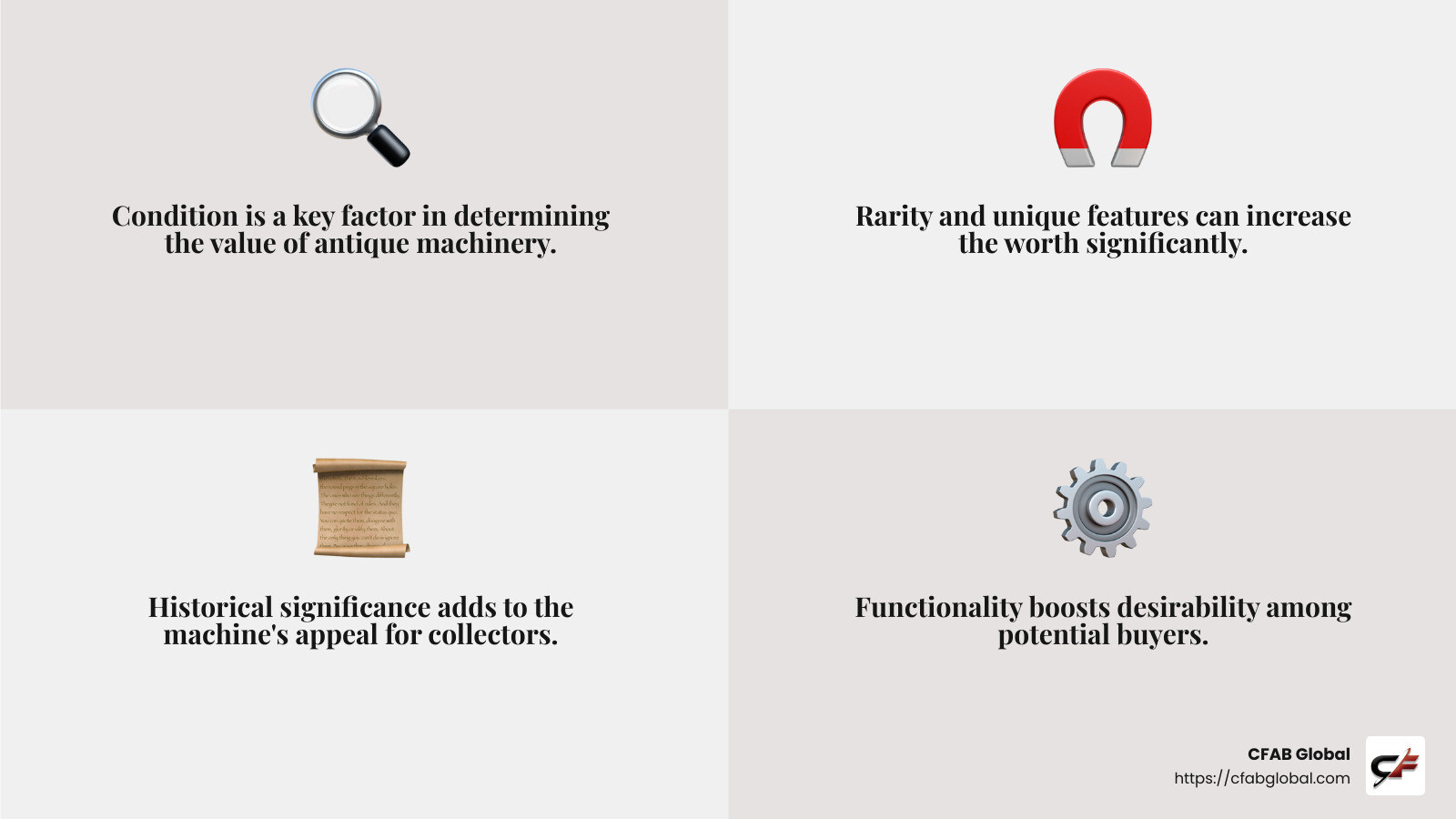
Engaging with these resources not only aids in evaluating machinery but also connects enthusiasts with a network of like-minded individuals. This community can offer support and advice, making the journey of collecting antique farm machinery both rewarding and informative.
As you dig into this fascinating world, understanding these factors will help you make informed decisions, whether you’re buying, selling, or simply appreciating the rich history of agricultural machinery.
Restoring and Maintaining Antique Farm Machinery
Restoring antique farm machinery is a journey that marries history with hands-on craftsmanship. Whether you’re a seasoned collector or a newcomer, these restoration tips and maintenance advice will help you preserve and enjoy your vintage treasures.
Restoration Tips
-
Parts Sourcing: Finding the right parts can be challenging, but it’s essential for a successful restoration. Start by checking online marketplaces like eBay or specialized forums where enthusiasts share tips and leads on rare parts. You might also find local antique tractor clubs useful for networking and sourcing parts.
-
Expert Advice: Don’t hesitate to reach out to experts or join collector forums. These communities are treasure troves of knowledge. Members often share detailed restoration guides and personal experiences that can guide you through tricky repairs.
-
Documentation: Keep detailed records of your restoration process. This includes photos, part numbers, and any modifications made. Not only does this help in troubleshooting future issues, but it also adds value to your machine by showing its restoration history.
Maintenance Advice
-
Regular Upkeep: Just like any machinery, regular maintenance is key to longevity. This includes routine oil changes and lubrication. For grease and oil solutions, consider using products from Texas Refinery Corp, known for their quality.
-
Storage Solutions: Protecting your antique machinery from the elements is crucial. Store them in a dry, covered space. If indoor storage isn’t an option, use heavy-duty tarps to shield them from weather damage.
-
Seasonal Checks: Before and after each use, especially if the machinery is operational, perform a thorough inspection. Check for rust, leaks, and ensure all moving parts are well-lubricated. Graco’s automated lubrication systems can be a great investment for ensuring consistent maintenance.
-
Preservation Techniques: For machines that are more for display than use, focus on preservation. This might include applying a protective wax or oil to metal parts to prevent rust.
Restoring and maintaining antique farm machinery not only keeps these historical pieces in working order but also preserves a piece of agricultural history. By following these tips and tapping into the community, you can ensure your antique machinery remains a cherished part of your collection.
Frequently Asked Questions about Antique Farm Machinery
What is the best way to determine the value of antique farm machinery?
Determining the value of antique farm machinery involves evaluating several factors. Start by assessing the machine’s condition. A well-preserved piece with original parts typically holds more value. Next, consider the rarity and historical significance. Machines from notable events or unique models can fetch higher prices.
Research is key. Use price guides and collector forums to compare similar items. These resources often provide insights into current market trends and recent sales. Additionally, attending auctions and estate sales can help you gauge what collectors are willing to pay.
How can I find parts for restoring antique farm machinery?
Finding parts for antique farm machinery can be a challenge, but there are several avenues to explore. Online marketplaces like eBay are a good starting point, offering a wide range of parts from various sellers. You can also search specialized forums where enthusiasts exchange parts and tips.
Joining local antique tractor clubs can be invaluable. These communities often have members with spare parts or connections to sellers. Don’t forget to check local classifieds and estate sales, as they occasionally feature rare parts.
Are there any specific brands that are more valuable than others?
Yes, certain brands tend to be more valuable due to their historical significance and collector demand. John Deere and International Harvester are two prominent names that often command higher prices. These brands have a rich history and are known for their durability and innovation.
When evaluating a brand, consider its historical impact and model rarity. Limited edition models or those that introduced significant technological advancements are particularly sought after. Collectors often have a preference for specific brands, so understanding market demand is crucial.
By understanding these aspects, you can make informed decisions whether you’re buying, selling, or restoring antique farm machinery.
Conclusion
In antique farm machinery, finding the right balance between passion and practicality is key. At CFAB Global, we understand the unique challenges and joys that come with collecting and maintaining these historical treasures. Our expertise in machinery solutions, particularly through our Machine Reliability Program, ensures that your prized possessions are not only preserved but also optimized for performance.
CFAB Global’s Machine Reliability Program is designed to improve the longevity and functionality of your antique machinery. We offer custom solutions that focus on predictive maintenance, helping you prevent breakdowns and reduce costly downtime. Our team of specialists works closely with you to create a strategy that fits your specific needs, ensuring your machinery operates at its best.
Our commitment to excellence extends across various industries, including agriculture, where we provide the support and equipment necessary to keep your antique farm machinery in top condition. Whether you’re a collector looking to restore a vintage tractor or a farmer seeking to maximize the efficiency of antique equipment, CFAB Global is your trusted partner.
For those interested in exploring more about our services and how we can assist with your antique farm machinery, visit our agricultural equipment page. Here, you’ll find information on how CFAB Global can help you maintain and improve your machinery’s performance, ensuring that these historical pieces remain a valuable part of your collection for years to come.
By choosing CFAB Global, you’re not just investing in machinery solutions; you’re joining a community dedicated to preserving the legacy of agricultural innovation. Let’s keep these machines running smoothly and efficiently, celebrating their history while preparing them for the future.
